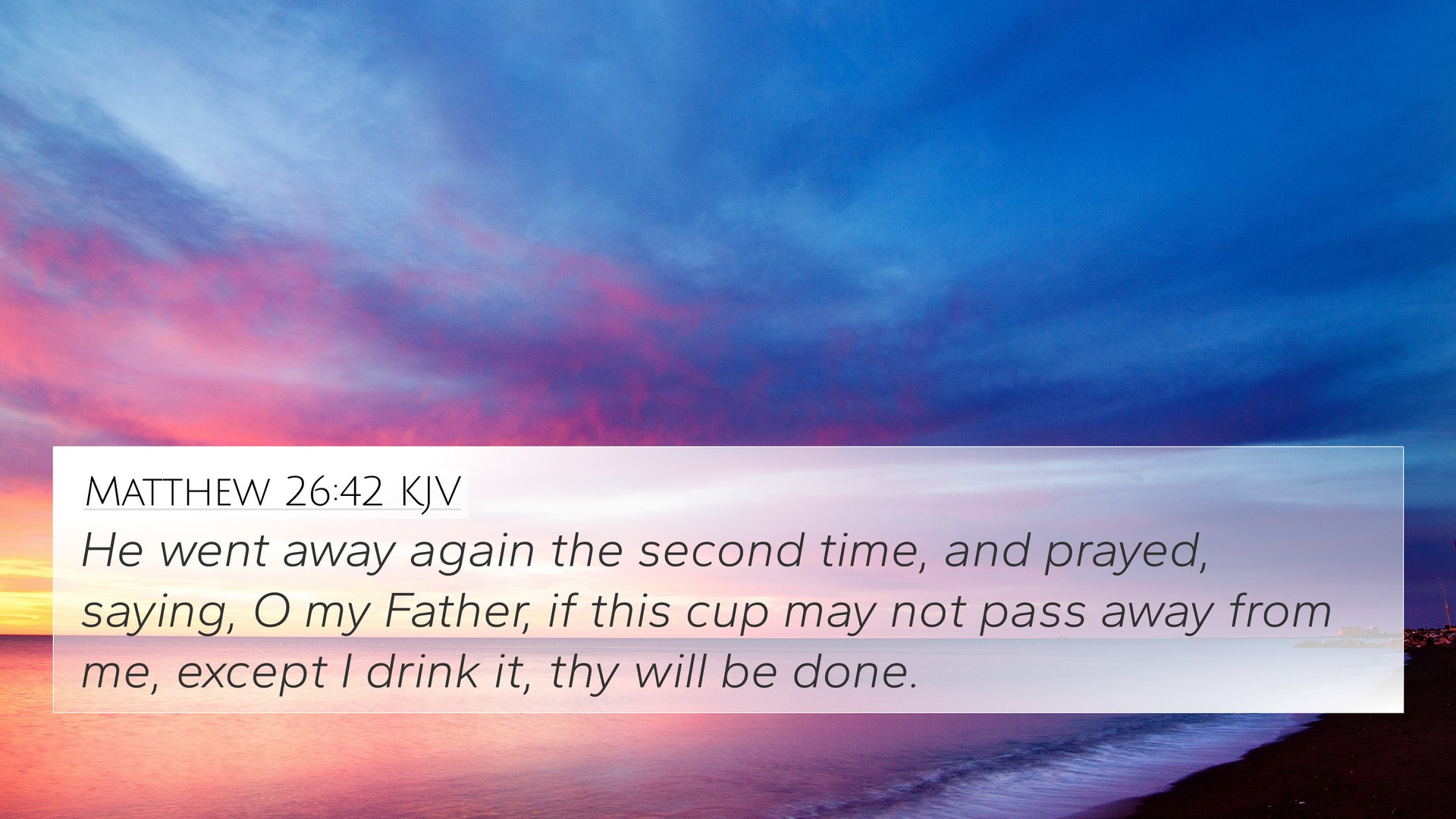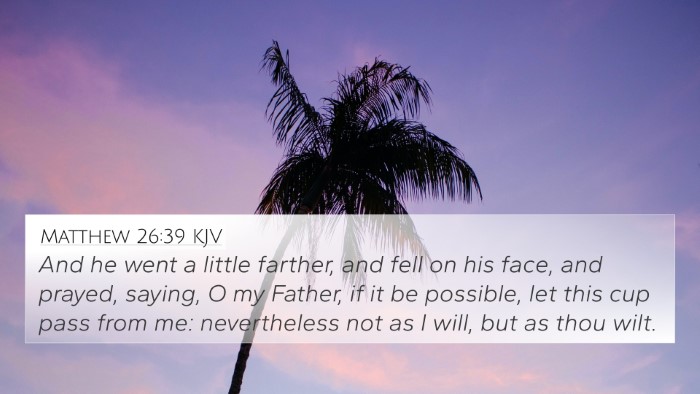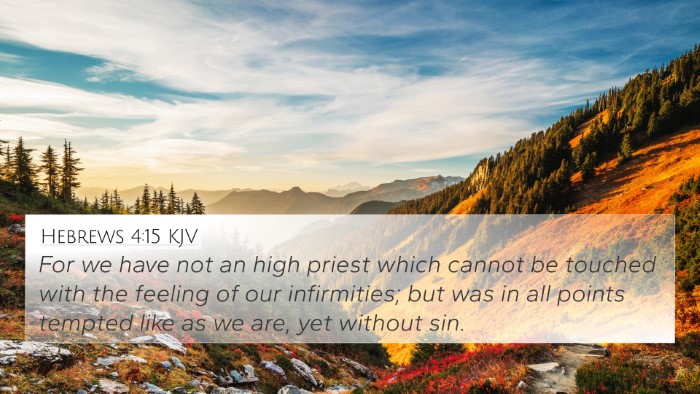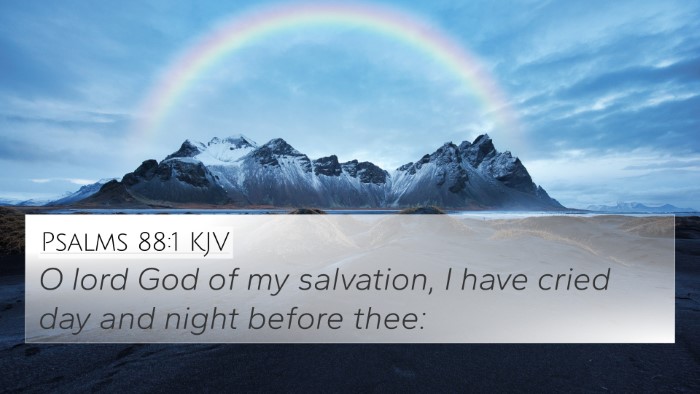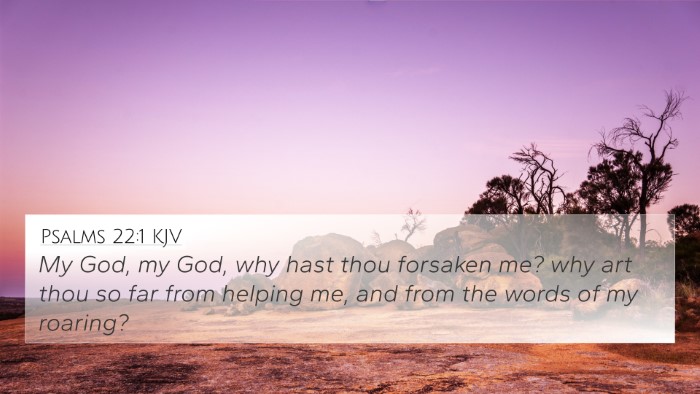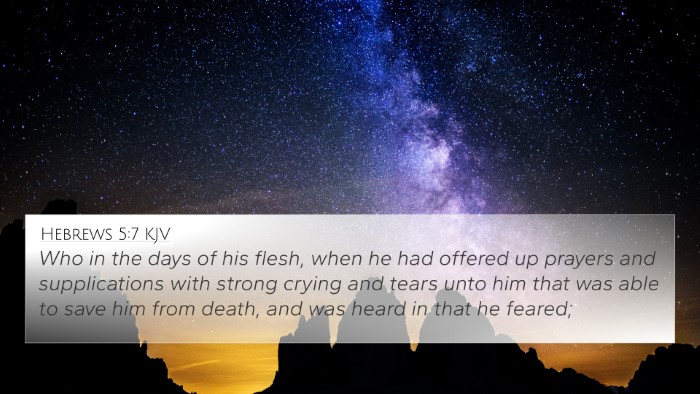Understanding Matthew 26:42
Matthew 26:42 states, "He went away again the second time, and prayed, saying, O my Father, if this cup may not pass away from me, except I drink it, thy will be done." This verse captures a profound moment of Jesus in Gethsemane, emphasizing His struggle and submission to the will of God.
Summary of Key Themes
- Prayer and Communion with God: Jesus models how to approach God in prayer, expressing deep emotions while seeking divine guidance.
- The Cup of Suffering: The metaphor of the cup symbolizes the suffering and sacrifice Jesus is about to endure.
- Submission to Divine Will: Despite His distress, Jesus submits to God’s will, demonstrating obedience and faith in the face of adversity.
Bible Verse Parallels
Matthew 26:42 intersects with several other scriptures, which helps to contextualize its meaning and significance:
- Luke 22:42: "Saying, Father, if thou be willing, remove this cup from me: nevertheless not my will, but thine, be done." This verse parallels Jesus' plea, highlighting His humanity and willingness to submit to God's plan.
- John 12:27: "Now is my soul troubled; and what shall I say? Father, save me from this hour: but for this cause came I unto this hour." This verse reflects the inner turmoil Jesus experiences facing His crucifixion.
- Philippians 2:8: "And being found in fashion as a man, he humbled himself, and became obedient unto death, even the death of the cross." This demonstrates the obedience of Jesus, even unto death.
- Hebrews 5:7: "Who in the days of his flesh, when he had offered up prayers and supplications with strong crying and tears unto him that was able to save him from death, and was heard in that he feared." This reveals Jesus' fervent prayers during His time of distress.
- Mark 14:36: "And he said, Abba, Father, all things are possible unto thee; take away this cup from me: nevertheless not what I will, but what thou wilt." This verse showcases the depth of Jesus’ plea to God and highlights His desire to align with God's will.
- Isaiah 53:10: "Yet it pleased the LORD to bruise him; he hath put him to grief: when thou shalt make his soul an offering for sin, he shall see his seed, he shall prolong his days, and the pleasure of the LORD shall prosper in his hand." This prophesies Jesus’ suffering and sacrifice.
- Romans 5:19: "For as by one man's disobedience many were made sinners, so by the obedience of one shall many be made righteous." This outlines the impact of Christ’s obedience.
- Matthew 26:39: "And he went a little farther, and fell on his face, and prayed, saying, O my Father, if it be possible, let this cup pass from me: nevertheless not as I will, but as thou wilt." This verse reemphasizes the emotional struggle of Jesus in the garden and sets the stage for the verse in view.
Commentary Insights
Several public domain commentaries provide depth to the understanding of this verse:
- Matthew Henry: He emphasizes the deep agony of Christ as He approaches the reality of His imminent crucifixion. Henry notes that this moment illustrates both Christ’s humanity and His divine mission.
- Albert Barnes: Barnes remarks on the theological implications of "thy will be done," suggesting that Jesus’ prayers reflect a perfect example of surrender. He stresses the importance of aligning personal desires with God’s purposes.
- Adam Clarke: Clarke adds that this moment symbolizes the ultimate act of obedience and the fulfilment of prophesies concerning the Messiah. He highlights the significance of "if this cup may not pass away," indicating the burden Christ bore for humanity’s sins.
Thematic Connections and Applications
This verse is rich in themes that resonate throughout Scripture, contributing valuable insights to personal and communal faith practices:
- Prayer: The verse encourages believers to earnestly seek God’s will in prayer, especially in moments of distress.
- Sacrifice: It invites reflection on the nature of sacrifice that accompanies true obedience to God.
- Empathy in Suffering: Understanding Jesus' struggle helps believers in their own moments of trial, knowing they can relate to Christ's sufferings.
- Faithfulness: It reaffirms the call to remain faithful and obedient, trusting in God’s greater plan.
Tools for Bible Cross-Referencing
To dive deeper into verses like Matthew 26:42, various tools can help:
- Bible Concordance: A useful tool for finding words and their locations in Scripture.
- Bible Cross-Reference Guide: Helps identify related verses and themes across the text.
- Cross-Reference Bible Study: A method that encourages comparing passages to enhance understanding.
- Bible Chain References: Systems that link verses that share thematic or contextual similarities.
- Comprehensive Bible Cross-Reference Materials: Resources that compile numerous cross-references for study.
Conclusion
Matthew 26:42 serves as a foundational text illustrating Jesus' willingness to submit to the will of God amid immense inner turmoil. By examining this verse alongside its parallels and insights from respected commentaries, believers can gain a deeper understanding of the themes of prayer, sacrifice, and obedience, which are central not only to the passion narrative but also to the broader narrative of Scripture.
